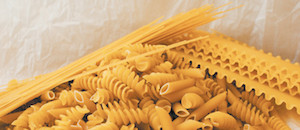Turkish Pasta Imports Contentious Issue
 Canadian pasta manufacturers want importers to stop bringing subsidized Turkish pasta into the country because it is hurting them along with millers and farmers. “Canada is becoming the North American dumping ground for cheap Turkish pasta,” said Don Jarvis, executive director of the Canadian Pasta Manufacturers Association (CPMA). “We are extremely concerned about the impacts that subsidized and dumped pasta will have on local Canadian businesses.” More than five million tonnes of pasta was imported into Canada from Turkey between January and November 2015, almost tripling 2014 import volumes. The landed price of that pasta was 50 percent less than Italian imports and 40 percent cheaper than U.S. imports, according to Statistics Canada.
Canadian pasta manufacturers want importers to stop bringing subsidized Turkish pasta into the country because it is hurting them along with millers and farmers. “Canada is becoming the North American dumping ground for cheap Turkish pasta,” said Don Jarvis, executive director of the Canadian Pasta Manufacturers Association (CPMA). “We are extremely concerned about the impacts that subsidized and dumped pasta will have on local Canadian businesses.” More than five million tonnes of pasta was imported into Canada from Turkey between January and November 2015, almost tripling 2014 import volumes. The landed price of that pasta was 50 percent less than Italian imports and 40 percent cheaper than U.S. imports, according to Statistics Canada. What makes the Canadian manufacturers nervous is that Turkish pasta is now being used in one of the house brands of a major Canadian retailer and more could follow.
They believe it poses a serious threat to the $300 to $400 million in annual Canadian pasta sales and to the millers and farmers who supply manufacturers with product.
The manufacturers typically consume 10 percent of Canada’s durum crop.
Bill Gehl, chair of the Saskatchewan Wheat Development Commission, doesn’t care if his durum goes to a Canadian pasta maker or one overseas. What he cares about is that it is sold to the highest bidder.
“That really is the question nowadays. Is Canadian wheat and durum being sold at a premium as it used to be?” he said.
Gehl doesn’t think that is the case.
“It seems that Canadian wheat is not only selling at a discount to American wheat over the last three years but it’s being sold sometimes at a discount to even Black Sea wheat.”
Jarvis doesn’t know what is be-hind the dramatic increase in Turkish pasta imports but the association has sent an open letter to importers and marketers to stop buying it.
If they don’t, the association will initiate a complaint with the Canadian Border Services Agency and the Canadian International Trade Tribunal requesting anti-dumping and countervailing duties be applied to Turkish pasta.
AGT Food and Ingredients operates the third largest pasta plant in Turkey. It exports its Arbella brand pasta to Canada and is also supplying the pasta used by some Canadian retailers in their brands.
Company president Murad Al-Katib said allegations that his company and others are dumping subsidized pasta are bogus.
“It’s absolutely ridiculous,” he said.
“For our company, we don’t buy any wheat from the Turkish government. We buy Canadian wheat. We buy Mexican wheat. We buy Turkish local production directly from farmers.”
He can’t understand why Canadian manufacturers are so upset about Turkish imports, which amount to $5 million of the $200 million in total pasta imports.
Al Katib believes Turkish pasta is cheap because of the devaluation of the Turkish lira.
“Canadian manufacturers have to compete. They’re part of a global market and we think that competition is really good,” said Al-Katib.
CPMA’s members are Catelli, Italpasta, Primo and Grisspasta. They are all located in Eastern Canada and account for 95 to 98 percent of Canadian production.
“You’ve got the big eastern Canadian players who have been established for a long, long time and it sounds like they don’t want a lot of competition,” said Al-Katib.
They could be facing more competition from AGT because the company recently added a specialty pasta production line at its facility in Mersin, Turkey, that will be operating at full capacity in 2016 and is also adding a sixth traditional pasta line this year.
Jarvis said it is absurd that Canadian durum can be shipped to Turkey and then turned into pasta that is shipped back to Canada and sold at a lower cost than Canadian product.
“That’s the real issue when you have subsidized production.”
The U.S. has been applying import duties on Turkish pasta for 20 years. Those duties were recently reviewed and additional duties were applied.
“You can’t buy Turkish pasta in the U.S. and that’s our concern that it’s being diverted here,” said Jarvis. (http://www.producer.com)
Last modified onSaturday, 06 May 2017 10:07
Latest from Admin TOA
- Calculatit.net Is Bringing Pricing Transparency to America’s Construction Industry
- Support Independent, Trustworthy Journalism
- Fat Sal’s Italian Specialties Welcomes Customers in Bayville, NJ with a Renewed Concept
- FFD Wood LLC Delivers Custom Woodwork Solutions from Long Island
- A Tax Expert in the U.S. Tax World: An Interview with Samet Oynamıs








